Your UPS suddenly fails during a storm. Critical systems go dark. How long should these power guardians last? Let's uncover realistic UPS lifespan expectations and how to maximize them.
The average UPS lasts 3-7 years, with lifespan determined by: battery type (lead-acid 2-5 years, lithium 5-10+ years), usage patterns, environmental conditions, maintenance frequency, and power quality. Premium models like APC can last 5-10 years with proper care.
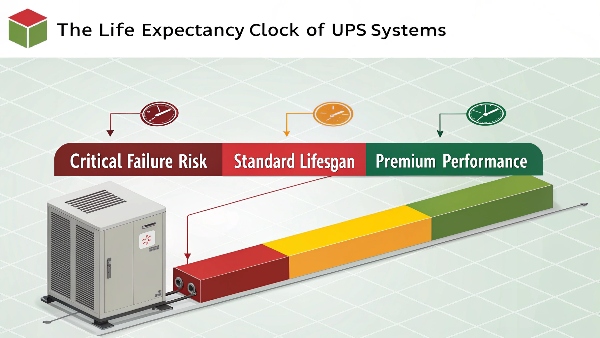
While numbers give a baseline, real-world performance varies wildly. I've seen UPS units fail in 2 years and others humming along after 15. Here's what makes the difference.
What is the average lifespan of an UPS?
Watch any data center manager's face when their UPS fails prematurely. That panic tells you everything about UPS lifespan importance. Real averages surprise many users.
Standard lead-acid battery UPS systems typically last 3-5 years. Lithium-ion models extend this to 5-10 years. The electronics often outlive batteries by 2-3 times, with many units operational for 10-15 years through multiple battery replacements.
Key Factors Determining UPS Longevity:
-
Battery Chemistry
- VRLA lead-acid: 2-5 years
- Lithium-ion: 5-10+ years
-
Usage Patterns
- Frequent discharges shorten life
- Regular full cycling wears batteries faster
-
Environmental Conditions Temperature Lifespan Impact 25°C (77°F) Baseline 30°C (86°F) 25% shorter 35°C (95°F) 50% shorter
I recently serviced a banking UPS that lasted 14 years. Their secret? Climate-controlled server room and quarterly maintenance. Contrast this with a manufacturing plant UPS that failed in 18 months due to dusty, hot conditions.
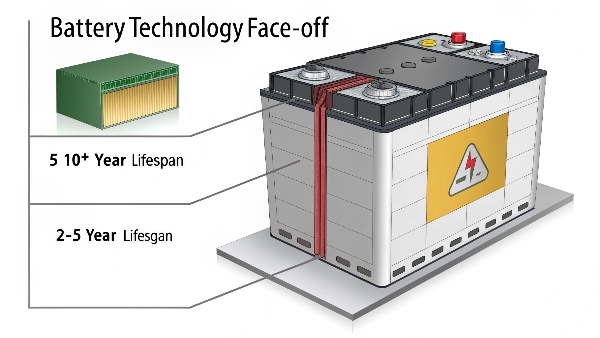
How long do UPS normally last?
The "normal" lifespan varies more than manufacturers admit. Industry expectations often differ from real-world results, especially across different applications.
In commercial settings, most users replace UPS systems every 5-7 years. Data centers typically get 7-10 years from premium units. Home/small office UPS often last 3-5 years due to irregular maintenance and environmental factors.
Real-world UPS Lifespan Examples:
- Data Center1 (24/7 operation): 7-12 years
- Hospital2 (climate controlled): 8-15 years
- Factory Floor3 (harsh conditions): 2-4 years
- Home Office (intermittent use): 3-5 years
Common Replacement Triggers:
- Failing batteries causing frequent alarms
- New equipment exceeding UPS capacity
- Efficiency improvements in newer models
- Expensive battery replacement costs
A telecom client extended their UPS lifespan to 11 years through our maintenance program: monthly inspections, annual battery tests, and immediate replacement of weak cells. Their $500/year maintenance saved $15,000 in premature replacements.
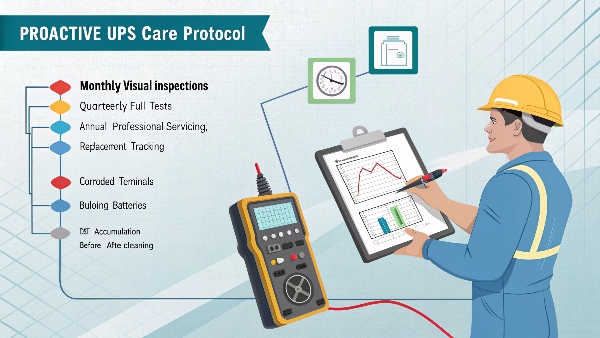
How often should an UPS be replaced?
Waiting for failure risks expensive downtime. Smart replacement planning balances cost, risk, and performance - here's how professionals decide.
Replace UPS batteries every 2-5 years (lead-acid) or 5-10 years (lithium). The entire UPS unit typically needs replacement every 7-10 years as components age, efficiency drops, and maintenance costs rise.
Replacement Decision Matrix:
| Factor | Consider Replacement When... |
|---|---|
| Age | Over 7 years for unit, battery at 80% of expected lifespan |
| Performance | More than 3 minor outages/year |
| Maintenance | Costs exceed 30% of new unit price |
| Technology | New models offer 20%+ better efficiency |
| Capacity | Load exceeds 80% of rated capacity |
Warning Signs for Immediate Replacement:
- Error codes persisting after reset
- Battery runtime below 50% of original
- Strange noises or burning smells
- Visible battery swelling or leaks
We helped a university data center implement phased replacements - swapping 20% of units annually. This smoothed budgets and prevented mass failures. Their uptime improved by 99.98% after implementation.
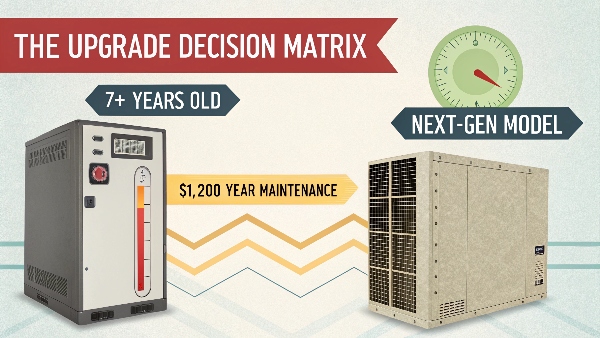
What is the lifespan of an UPS?
APC by Schneider Electric dominates the UPS market, but their products aren't immortal. Understanding their actual lifespan helps planning.
UPS systems typically last 5-10 years with proper maintenance. Their Smart-UPS series averages 7+ years, while Back-UPS models last 3-5 years. Enterprise Symmetra systems can exceed 10 years with scheduled component replacements.
Model Lifespan Comparison:
| Model Series | Avg. Lifespan | Replacement Parts Available For... |
|---|---|---|
| Back-UPS | 3-5 years | Up to 7 years after discontinuation |
| Smart-UPS | 5-8 years | 10+ years support |
| Symmetra | 10-15 years | 15+ years support |
| Galaxy | 7-10 years | 12 years support |
Battery Replacement Facts:
- Original batteries last longest (3-5 years)
- Third-party options often cheaper but shorter-lived
- 'Smart' models alert when batteries need replacement
- Swapping batteries resets the clock on electronics
A client's Smart-UPS 3000 lasted 9 years in their recording studio. The secret? They replaced batteries every 2.5 years and kept it in their climate-controlled equipment room. The electronics still worked when they finally upgraded.
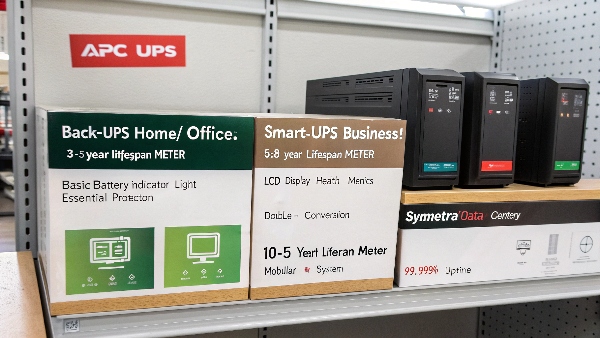
Conclusion
UPS lifespan ranges from 3-15+ years depending on quality, maintenance, and environment. Regular battery replacement extends electronics life. Plan replacements before failures occur using performance data.
-
Explore this link to understand how UPS systems perform in data centers and their longevity under continuous operation. ↩
-
Learn about the critical role of UPS systems in hospitals and their expected lifespan in climate-controlled environments. ↩
-
Discover the challenges UPS systems face in harsh factory conditions and how it impacts their lifespan. ↩

